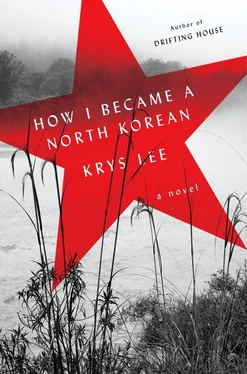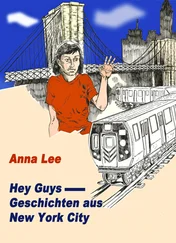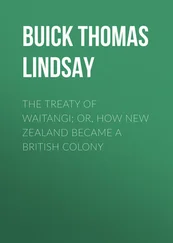“Was it God’s will that they lived in a cave? Even in March, it gave a new definition to the word cold.”
She looks guilty, pained. “I’m sorry, Daehan, I’m so sorry for everything.”
I want to tell her it isn’t her fault. To say that I’m now fairly confident that I’ll live a fairly happy life, whatever that means. That I finally understand the impossibility of orchestrating the future or who I am. That I sometimes dream of rivers of floating eyes. That all of those eyes are Missionary Kwon’s. Instead I massage her shoulder. “I’ve had a break,” I say. “I can take over the driving now.”
We finally arrive. I had assumed that images would come rushing back to me as soon as I faced the building, like in a movie, but nothing of the sort happens. Shredded, weather-worn Bubble Wrap hangs from the windows, the building’s walls are streaked green with water stains, and the stairwell is rusted orange to the point of looking dangerous. In the building’s shadows, the ice is still hard and stubborn.
My mom stays in the car as I walk toward the building. The yard’s the same tangle of knee-high weeds. I think about the little I learned about my friends through my mom’s contacts. Gwangsu out-Christianed the zealous South Korean church community, and after a couple of years in Daegu working odd jobs, he got a scholarship to seminary school. Namil was placed with adoptive parents through a Korean American church in Fairfax, Virginia. Bakjun ended up in Seoul, but after brawling in the kimchi factory he worked at whenever someone called him a spy or a dirty North Korean, he successfully applied a second time for refugee status in England, citing discrimination in the South, and settled in a New Malden boardinghouse. No one knows what happened to Cheolmin. Then there’s Yongju. And Jangmi. I haven’t heard from either of them since receiving a single phone call through the broker, letting me know they had reached safety. Halfway up the stairs, I stop. It’s better not to continue.
As we drive back, my mom says, “Your friends, I hope they’re doing well, wherever they are.”
My eyes fill with the brown, bare landscape. “They’re survivors,” I say. This far north, it’s as if winter never quite ended.
At first there was loneliness. Then there was loss. And then there was a greater loneliness, the loneliness of freedom. Freedom: Once I am truly safe, I see that there is too much of it. Freedom means you are free not to care about anyone or anything. Freedom shows me that all that matters to the free world is money.
Before I understood what freedom meant, Jangmi and I blindly followed the broker through Chinese terrain ranging from bare plains to semitropical cities, then made that final jungle crossing from Laos into Thailand, where we sheltered each other for months in the crowded Bangkok detention center. The ground had shifted beneath me, becoming yet another new country, and the only stability was this primitive desire to live, and Jangmi. But in South Korea Jangmi and I were separated by a mosaic of men from their National Intelligence Service, who put me through weeks of lengthy security interrogations. Then I was finally admitted into the Hanawon resettlement center for the three months of required reeducation. I grieved, but I couldn’t hold on to anger; it moved through my hands like water. I didn’t feel trapped like the others, who were impatient to start a new life outside of the brick building’s lecture rooms and routines; I was looking for Jangmi.
That first week I discovered her after a talk given by one of our people who had resettled in the South years ago.
The man at the podium had a face shiny with moisturizer and wore his collar flipped up like Elvis. He said, “I was you once,” with the flat cadence of someone from Seoul, most of his Pyongan region accent rubbed out. He gave us warnings I didn’t understand yet as he relayed his experience of resettling, and proudly mentioned having a South Korean wife. His exertions were wasted. I was in the back, and in front of me rows of heads hung heavily like a field of sunflowers.
I saw Jangmi in the corridor after I left the lecture room.
Though we all wore the same orange jacket and black pants, I recognized her from her feline movements and the drag of one foot. Her arms were linked with the arms of two other women heavier-set than she was, and I sprinted forward until I got ahead of them and confirmed that it was her. The same harmonious proportion of eyes to nose to lips, tension alive in her every gesture. She was laughing, her smile as bright as the cheap rhinestone pin in her hair. My family’s background had slowed down my interrogation, and I later learned that she had been in Hanawon at least a month longer than me. It was as if she had moved so fast that the past couldn’t catch up with her. She was already blooming in this new country.
“Jangmi!” I said.
All the light in her disappeared and her arms dropped limply to her sides. We had hidden, pressing together in filthy train bathrooms and clawing our way through suffocating jungles, trusting whatever the broker told us to do. She was the only person in the country who knew me. Her eyes clouded over and she swerved away from me as if I were a distant, unpleasant memory, uncoupling herself from her friends.
I grabbed her wrist. “Jangmi,” I said again.
“You know I wouldn’t go by that name anymore,” she said. “It’s old-fashioned, anyway.”
A bright smile overwhelmed her again as if she was determined to cover up the past. I wanted to reach her, but I didn’t know where to start, and the oppressive wall of her face seemed a kind of plea.
I said, “I just arrived. They kept me longer than I’d imagined, cross-referencing and checking and double-looping my words back to me, until I couldn’t have lied even if I wanted to.” Except about Missionary Kwon. Always about Missionary Kwon.
“I’m leaving here soon enough. I didn’t have your kind of family,” she said.
“Have you seen the others?”
“Why would I want to?” She cupped her hands together as if to share a secret and said, “You should keep your eyes and ears open here — there’s a lot you can learn outside the classroom, if you pay attention.”
I took her chin in one hand and made her look directly at me. “I know you. You don’t have to pretend with me.”
“You’re always living in the past. I belong to the future, I always have.” She stepped back. “It’s dangerous to live in the past.”
She turned away from me, and I understood that the ghost of Missionary Kwon was standing between us.
I knew how to wait. I knew how to be patient.
• • •
In South Korea, I meet a few of our people who have become brokers themselves and forge new routes out of China to bring our people to safety. I meet a South Korean Christian couple who sold their house and used that money to get people out. But I am no hero. I am one of the lucky ones. I studied for the college entrance exams and then matriculated into a famous university in Seoul. I work part-time for the South Korean government as a source of information on the North. I write for the university newspaper, hand out flyers about the human rights crisis in our country to impervious crowds, help release giant helium balloons with supplies and information north across the thirty-eighth parallel toward home. Home, a country that feels more like my country the longer I live in the South, which will never let us forget. I am a model North Korean refugee; I testify in front of churches, to the National Assembly, to anyone who will listen. I make endless inquiries into my family’s fate, striking back in my small way at the gated mansion that took my abeoji, at the man in the red leather jacket. I have returned to China several times on my South Korean passport that has my new name, following tendrils of rumors about my eomeoni, my dongsaeng .
Читать дальше












